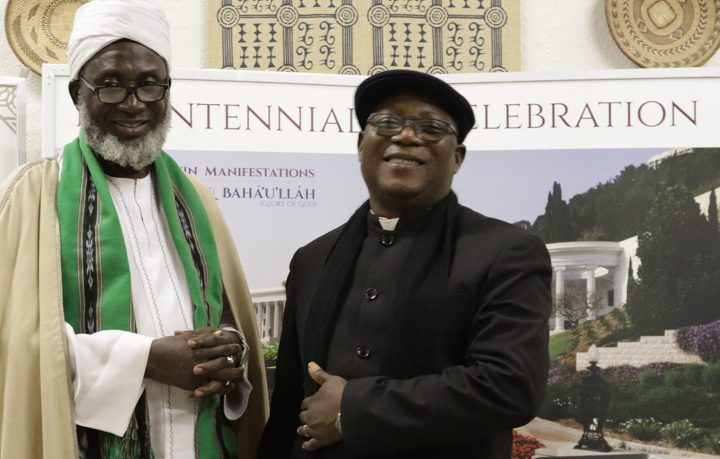INTER-FAITH HARMONY
The imam and the pastor: from being enemies to ‘partners in peace’

In a world where extremism has painted religion as a catalyst for bloodshed, two Nigerian men of different faiths have proven that reaching common ground is possible – despite fundamental differences.
Pastor James Wuye and Imam Muhammad Ashafa led opposing sides of a deadly conflict in Kaduna, Nigeria, an area known for violent clashes between its Christian and Muslim populations.
Twenty-six years later, the two are almost inseparable. They joked and laughed during an inter-faith dialogue at the Cape Town Bahá’í Centre in Rosebank on Thursday 24 October as they shared a harrowing tale of turning from being enemies to becoming “partners in peace”.
The evening was hosted by Initiatives of Change South Africa, a worldwide movement encouraging social cohesion, and facilitated by economist Iraj Abedian, who serves on the board of the National Spiritual Assembly of the Bahá’ís of South Africa. It was part of a series of “Meaningful Conversations” taking place in different cities.
Wuye, dressed in black clerical garb, and Ashafa, clothed in a loose-fitting green and white robe, sat side-by-side as they described Nigeria’s volatile social climate.
“At the slightest provocation, we can go at each other’s throats and kill each other,” said Wuye, mentioning issues like Boko Haram and the country’s scourge of kidnapping.
It seems Nigeria’s rich diversity is both a blessing and a curse. With a population of just under 200 million people, roughly 250 official languages and three primary religions – Christianity, Islam and multiple indigenous faiths – it is a hotbed of intolerance.
“We come from a background of our sensitivity to issues of religion and ethnicity,” said Wuye explaining how religion and ethnicity are interlinked and have become “political tools” in Nigeria – and in Africa as a whole.
“Because of the power held by religious leaders, people listen.”
Ashafa agreed, mentioning the frequent use of inflammatory remarks to instigate violence, such as quoting scriptures from the Bible or the Quran out of context.
This divide was clearly seen in Nigeria’s violence-wracked 2015 election between former President Goodluck Jonathan, a Christian, and current leader Muhammadu Buhari, a Muslim.
Wuye and Ashafa were products of these tensions and both paid a heavy price.
Wuye pointed out an artificial limb, the result of losing part of his arm during conflict in 1992. Ashafa spoke of losing two brothers and his spiritual mentor.
Both men trained militia in Kaduna to intimidate and kill members of the opposite side but, after the government and Unicef invited them to address locals about immunisation against killer diseases, the two were encouraged to join forces and fight for peace in the region.
“A man took our hands, put them one on top of the other and said, ‘Ashafa and James, I want you to keep this city in peace. Yes, you can do it, please talk’,” explained the imam.
Despite their hatred of one another, they eventually agreed to join forces and in 1995 founded the Interfaith Mediation Centre, a religious grassroots organisation that mediates between Christians and Muslims throughout Nigeria.
Significantly, with the dialogue being held at the Bahá’í centre, the Christian-Muslim conflict in Nigeria has a similar narrative to the clash between Muslims and Bahá’ís in the Middle East.
The Bahá’í are one of the most persecuted religious groups in the world. This is especially so in Iran, where they are harassed, denied basic services and barred from attending universities amongst other human rights violations.
The religion promotes many progressive teachings such as racial unity and gender equality, but because the faith is seen as heresy by some clerical Muslims for intimating that Baha’u’llah, the religion’s main prophet, came after the prophet Muhhamad, who in Islam is seen as the last and final prophet.
“We just have fundamental differences about who the messengers of God are,” said Ashafa about his relationship with Wuye, adding that such divisive issues could be worked through. DM


















 Become an Insider
Become an Insider